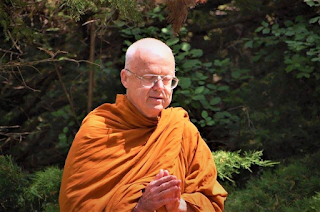Keeping the Breath in Mind & Lessons in Samadhi, by Ajaan Lee Dhammadharo.
Translated by Ṭhānissaro Bhikkhu.
By and large, we tend to be interested only in discernment and release. At the drop of a hat, we want to start right in with the teachings on inconstancy, stress, and not-self—and when this is the case, we’ll never get anywhere.
Before the Buddha taught that things are inconstant, he had worked at knowing them until they revealed their constancy. Before teaching that things are stressful, he had turned that stress into pleasure and ease.
And before teaching that things are not-self, he had turned what is not-self into a self, and so was able to see what is constant and true, lying hidden in what is inconstant, stressful, and not-self.
He then gathered all of these qualities into one. He gathered all that is inconstant, stressful, and not-self into one and the same thing: fabrications (saṅkhāra) viewed in terms of the world—a single class, equal everywhere throughout the world.
As for what’s constant, pleasant, and self, this was another class: fabrications viewed in terms of the Dhamma.
And then he let go of both classes, without getting caught up on ‘constant’ or ‘inconstant,’ ‘stress’ or ‘ease,’ ‘self’ or ‘not-self.’ This is why we can say he attained release, purity, and nibbāna, for he had no need to latch onto fabrications—whether of the world or of the Dhamma—in any way at all.
This was the nature of the Lord Buddha’s practice. But as for our own practice, most of us act as if we have everything figured out beforehand and have succeeded even before we start.
In other words, we want simply to let go and attain peace and release. But if we haven’t laid the full groundwork, our letting-go is bound to be lacking: Our peace is bound to be piece-meal, our release is bound to be wrong.
Those of us who sincerely mean well and want only the highest good should ask ourselves: Have we laid the proper foundation? If we don’t lay the proper foundation for release and letting go, how will we ever be free?
The Buddha taught that virtue can overcome common defilements, the gross faults in our words and deeds; that concentration can overcome such intermediate defilements as sensual desires, ill will, torpor, restlessness, and uncertainty; and that discernment can overcome such subtle defilements as craving, clinging, and obscured awareness.
Yet some people whose discernment is sharp, who can clearly explain subtle points of doctrine, can’t seem to shake off the more common defilements that even virtue can overcome. This shows that something must be lacking in their virtue, concentration, and discernment.
Their virtues are probably all on the surface, their concentration splotchy and stained, their discernment a smeared-on gloss—like the glass coated with mercury—which is why they can’t attain the goal.
Their actions fall under the old saying: Keeping a sword outside the scabbard—having a way with words and theories, but no center for the mind; laying an egg outside the nest—looking for goodness only outside, without training the mind to be centered; resting a foundation on the sand—trying to find security in things of no substance. All of this is bound to bring disappointment. Such people have yet to find a worthwhile refuge.
So we should lay the groundwork and put the causes into good working order, because all the attainments we hope for come springing from causes.
attanā codayattānaṁ
paṭimaṅse tamattanā
Rouse yourself. Train your own heart.
Start pondering your own in-and-out breath.
~ ~ ~ ~ ~ ~ ~
Keeping the Breath in Mind & Lessons in Samadhi, by Ajaan Lee Dhammadharo.
Translated by Ṭhānissaro Bhikkhu.
https://www.dhammatalks.org/ebook_index.html#keepingthebreath
20 April 2023


No comments:
Post a Comment